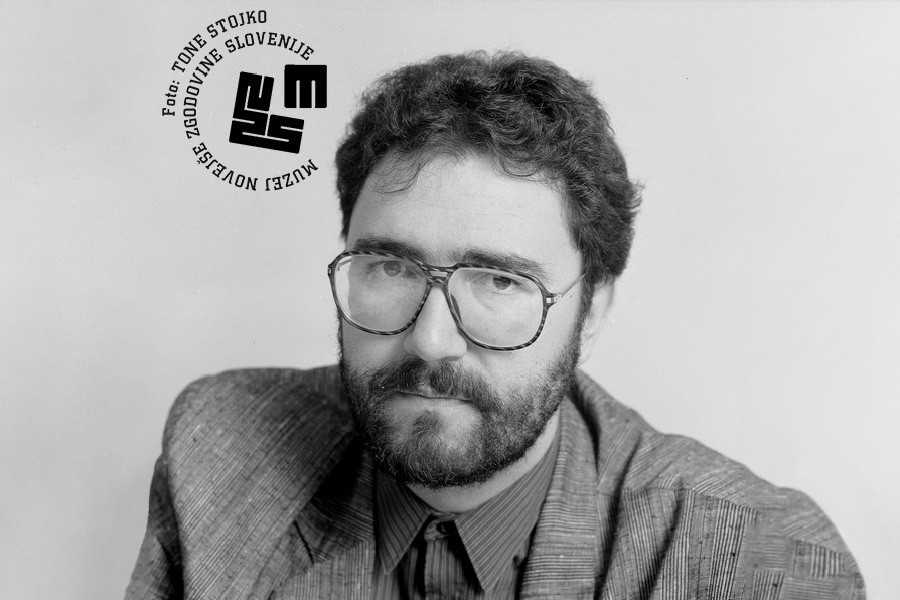1. 3. 1991: Franco Juri against the transfer of conscripts to the Slovenian Territorial Defence
At its January session, the Slovenian Assembly demanded that the Slovenian Government, then officially called the Executive Council, impose a moratorium on sending the Slovenian conscripts to serve in the Yugoslav People's Army (YPA) until the adoption of a new Slovenian Constitution.
A working draft for the amendment to the Slovenian Constitution
The Government drew up a working draft to amend Articles 96 and 97 of the Slovenian Constitution on civil defence. The amendments provided for the military training of Slovenian conscripts in the Slovenian Territorial Defence and the police.
However, if it was impossible to provide training for soldiers in these bodies and if conscripts were therefore put at a disadvantage, military service could exceptionally be served in school centres and schools for reserve YPA officers.
Supporters and opponents of the Slovenian army
On 1 March 1991, the draft constitutional act was discussed by members of the Constitutional Commission of the Slovenian Assembly. According to the newspaper Delo, two views clashed in the Constitutional Commission. One was the view of Deputy Franco Juri of the Liberal Democracy of Slovenia (LDS) opposition party.
Juri opposed the proposed constitutional act, as in his opinion the moratorium would contribute to a demilitarised state and not to the strengthening of the military in Slovenia.
The opposite view was summed up by Deputy Ciril Kolešnik, a member of the Slovenian Christian Democrats (SKD). He said that his party understood the moratorium as a suspension of sending the conscripts to serve in the YPA, which of course did not mean that Slovenia would not have its own army.
Janša's explanations to the deputies
The constitutional act proposal was also explained to the deputies by the Minister of Defence in the Demos government, Janez Janša. Among other things, he said that no resolution of the Assembly addressed a moratorium on serving in the Territorial Defence and internal affairs bodies.
He also said that during the discussions on the minimum functioning of the federation, the Slovenian political leadership proposed to the federal government in Belgrade that the YPA gradually withdraw from Slovenia within three years.
No response from the federal government
During that time, Slovenia would finance the army’s critical functions. Slovenia's proposal also provided that the YPA vacate one-third of the facilities in Slovenia by 1 August 1991. The federal government had not yet responded to these proposals, said the Minister of Defence.
Before the vote in the Constitutional Commission, Janša emphasised that the dilemma was completely clear: either the moratorium is accepted and the conscripts will not be sent to serve in the YPA in March, or the opposite. The Constitutional Commission then voted in favour of the draft constitutional act and submitted it to the Assembly as a proposal.
Federal Presidency against Slovenia and Croatia
While Slovenian deputies discussed the constitutional act that enabled the training of Slovenian soldiers in the Territorial Defence and the police, the Yugoslav political crisis intensified.
The Yugoslav Federal Presidency condemned the resolutions on secession adopted by the Slovenian and the Croatian Assembly. The Slovenian member of the Federal Presidency Janez Drnovšek and his Croatian counterpart Stipe Mesić voted against the condemnation of the resolutions.
The federal government against the resolutions
The federal government also reacted aggressively to both resolutions, saying that they could not be a legal basis for secession from Yugoslavia or the dissolution of the Yugoslav republics.
Author: Aleš Žužek
Similar articles
-
Triumphant Year of 1991
-
9. 5. 1991: Facilitated processing of independence laws
-
2. 3. 1991: Slovenians abroad and around the world in concern for Slovenia
-
1. 3. 1991: Franco Juri against the transfer of conscripts to the Slovenian Territorial Defence
-
28. 2. 1991: Prepared defence and protection act proposal to ensure a plebiscite decision
-
27. 2. 1991: The persistently looming red star
-
26. 2. 1991: A hopeless search for the Yugoslav modus vivendi
-
16. 2. 1991: Ciril Ribičič on the red star and reservations about the dissolution of Yugoslavia
-
15. 2. 1991: Two thirds of respondents have faith in an independent Slovenia
-
27. 1. 1991: Between a relaxation of tensions at home and a deteriorating situation in the Middle East



